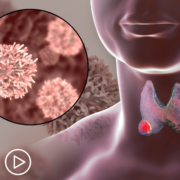Understanding Thyroid Cancer Treatment Options and Follow-Up Care
Understanding Thyroid Cancer Treatment Options and Follow-Up Care from Patient Empowerment Network on Vimeo.
What’s key for thyroid cancer patients to know about treatment options and follow-up care? Expert Dr. Megan Haymart from the University of Michigan shares her expert knowledge about various treatment paths and proactive patient advice to ensure optimal care.
[ACT]IVATION TIP
“…it would be important to ask how many surgeries have you done in the past year? Typically high volume is considered more than 25, very high volume, some of the physicians, some of the surgeons will do 100 a year. So that’s very important to ask this and ask them what is their complication rate? What are the complications that we might see?”
See More from [ACT]IVATED Thyroid Cancer
Related Resources:

Thyroid Cancer Explained: Types, Staging, and Patient Communication |

|

|
Transcript:
Lisa Hatfield:
Dr. Haymart, can you explain the typical treatment journey for someone newly diagnosed with thyroid cancer and what can patients expect in terms of surgery, radioactive iodine therapy, and follow-up care?
Dr. Megan Haymart:
So patients typically have a biopsy and that’s how they find out they have thyroid cancer. Afterwards, they’re most often referred to surgery and so when they meet with the surgeon, the surgeon might talk about one, not doing the surgery, so just following it. But we don’t do that as often, but sometimes with small cancers and depending on what else is going on in a patient’s life at the time. Two, they might offer lobectomy. So the thyroid is a butterfly-shaped gland in the neck. So they might talk about taking out half the thyroid, not the whole thyroid. Or they’ll talk about a total thyroidectomy, taking out the whole thyroid. They should talk about the risk and benefits of both of those.
After the surgical pathology is back if someone had a total thyroidectomy for papillary or follicular thyroid cancer, radioactive iodine is a treatment option. And again, it’s not recommended for everybody, but for some patients, the things within the pathology look higher risk. There might be lymph nodes involved or signs of invasion. Radioactive iodine is a treatment option.
And then long-term, most patients are followed with neck ultrasounds, with laboratory work. Sometimes if there’s more suspicion, they may have additional, a suspicion of recurrence, they may have additional imaging, but for the most part, it requires lab work and periodic neck ultrasound during follow-up.
And so when patients are sort of along this pathway, I think a couple of things are important to know. One, sometimes it doesn’t move super fast. So it’s pretty typical, like between diagnosis and meeting with the surgeon, it might be a month, and then surgery might be a month or so after that. Radioactive iodine might be a couple months after that. And so that first six months to a year can be very stressful for a patient. So I think that’s important to know.
And then two, I think it’s important to make sure that when you go along this process, you have physicians that you trust and that you can rely upon. So you can still talk with your PCP who you know quite well. You may now have an endocrinologist that you see, and this might be new for you. You may have a surgeon that you see, and this might be new for you. And so you want to ask them the questions that you have.
And my activation tip would be that you want to make sure that you have high volume and experienced specialists. So, for example for surgery, it would be important to ask how many surgeries have you done in the past year? Typically high volume is considered more than 25, very high volume, some of the physicians, some of the surgeons will do 100 a year. So that’s very important to ask this and ask them what is their complication rate? What are the complications that we might see?
And then similarly for the endocrinologist, you want to ask what proportion of your patient population are thyroid cancer patients? How comfortable are you following thyroid cancer patients long-term? And you may get varying answers. And so I think it’s important just to ask these questions so that you feel comfortable that you have experienced providers taking care of you.



